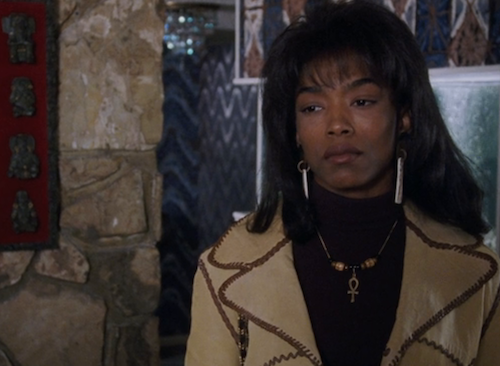What's Love Got to Do with It
Written by Andreas Babiolakis
In honour of the late Tina Turner, here is a review of the biopic based on her memoir I, Tina: My Life Story. Directed by Brian Gibson and starring Angela Bassett and Laurence Fishburne (as Tina and Ike Turner, respectively), let’s revisit What’s Love Got to Do with It.
Anna Mae. The Queen of Rock ‘n’ Roll. Tina Turner. Whatever you know her as, she is one of the all time greatest vocalists in all of music. For me, almost no performance comes close to the visceral, raw purity of “River Deep — Mountain High”: an untouchable song with an even more miraculous vocal at the forefront (it’s one of the only times a Phil Spector production’s ambition still feels less monumental than the talent it is centred around; the other exception being Bobby Hatfield and The Righteous Brothers’ “Unchained Melody”). We lost a titan yesterday, the very word containing the letters of “Tina” with an extra “T” for “Turner”. What was the story behind such a star? Well, that’s old news by this point. Turner was well established as a figure of survival for decades now. Part of that stature came from her autobiography I, Tina: My Life Story (co-written by columnist Kurt Loder).
Then came the followup biopic What’s Love Got to Do with It by Brian Gibson: a diluted, straightforward depiction of the Anna Mae Bullock story. By now, everyone knew: Tina survived years of abuse while married to Ike. The latter discovered her and wanted to make music with her, but his addiction issues and jealousy is all that he will be remembered for because of how much he allowed his despicable side to rule him. While What’s Love Got to Do with It is direct, there are some directorial choices that actually enhance this depiction quite a bit. The simulated home footage (quite convincing for the early nineties) sells the point that these are real people. The artificiality of these moments is obvious and the film makes it so: this is what people pretending to be happy want you to believe. What’s Love Got to Do with It is more concerned with the story behind the music, and the clever usage of the Tina Turner song as the title of this feature film (both a tribute and the questioning behind domestic abuse by a monster that claims to love their prey) shows this. Additionally, the J and L cuts that keep the iconic music flowing over images of torment (Tina unhappy at home, Ike blacked out from substance abuse, Ike with eyes of envy as Tina succeeds) cements this goal further.
Angela Bassett turns in an all-time performance as Tina Turner in What’s Love Got to Do with It.
While the film itself does a decent job at portraying the tribulations Tina faced in her marriage and musical partnership with Ike, the real mastery — like Tina Turner in “River Deep — Mountain High” — comes from those at the front of the film. A quick shout out to Laurence Fishburne who is tremendous as Ike Turner: a genuinely frightening, explosive performance that sells the gaslighting nature of the disgraced musician. The main reason why people continue to discuss What’s Love Got to Do with It, and why it remains as good as it is, is thanks to one Angela Bassett who “did the thing” decades ago as Tina Turner with a career-defining performance. Playing Tina from her teen years and up to the eighties, Bassett is incredibly committed to being the legend in this film. She may lip sync throughout the entire picture, but you wouldn’t know it at first glance: her entire body convulsed and veins pop out of her neck as she “sings”, and even her breathing is precisely on time. The fact that Bassett chose to put the hurt Tina felt throughout her life into her iconic performances is special; for example, it puts extra magic into “River Deep — Mountain High” (it’s a sequence that sends shivers down my spine). During the most challenging scenes, Bassett feels too real: like we actually are witnessing attacks take place. Bassett would have had an Oscar by now if she wasn’t up against Holly Hunter in The Piano: two of the greatest performances of the nineties were up against each other in the same category. It really depends on what you prefer overall: a complete embodiment of a recognizable icon, or a minimalist performance that draws you closer to examine its finer details. It’s a shame, because both performances are all-timers. This would have been the perfect opportunity for a tie.
Does Bassett need the Academy Award, though? No. Thirty years later, she is still championed for her breathtaking work that captured Tina Turner with precision, elegance, and vitality. What’s Love Got to Do with It’s focus on the challenging relationship between Tina and Ike boosts it beyond being strictly cookie cutter material (this is as much about Tina Turner being a survivor than it is her singing career), and it is the pair of performances by the two leads that gets the film where it needs to go. I know Tina Turner herself didn’t fully approve of the film because it was missing some of the scarier details of her life, but Gibson concluded that maybe people wouldn’t have believed the full story. She also wasn’t fond of how the film painted her out to be a victim rather than a strong individual that could make it out on her own (which she eventually did, thankfully), and I completely understand where she was coming from. At the same time, I think the severity of Tina’s experience is necessary so we can really know where she came from (but, to this point, maybe including everything would have been wiser).
It still met Tina’s approval if she provided the vocals for the film (I mean, who else was going to sing Tina other than Tina?), and it continues to astonish fans and the unfamiliar to this day. When Tina Turner passed, a shockwave rippled through the world: this is how we truly knew her magnitude. Maybe What’s Love Got to Do with It captures only a portion of her impact, but it’s enough for upcoming generations — who sadly won’t grow up with her presence — to learn what a brilliant tour-de-force she was. Her story deserves to be shared for decades to come; to remind everyone of a magnificent vocalist and an even stronger woman. Her legacy and story deserves to be known for good, with all of its main and finer details; river deep, mountain high. Brian Gibson got us part of the way there, but it is Angela Bassett that has furthered Tina Turner’s legacy in ways many thespians cannot, and that in and of itself is an achievement to behold.
Andreas Babiolakis has a Masters degree in Film and Photography Preservation and Collections Management from Toronto Metropolitan University, as well as a Bachelors degree in Cinema Studies from York University. His favourite times of year are the Criterion Collection flash sales and the annual Toronto International Film Festival.






